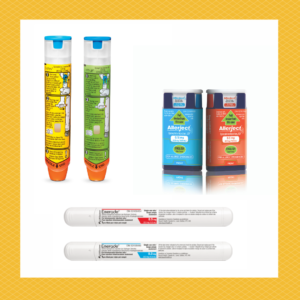Have your say and participate in a consultation on natural health products and a study on introducing baked milk and/or egg. Read information from Health Canada on crustacean allergy and edible insects, and advocate for accurate ingredient labelling. Find out what’s new in research, including a study on the use of epinephrine before going to the hospital for anaphylaxis. Plus, check out our mythbuster on whether food allergen labelling laws apply to natural health products.
Advocacy in action: Help us get food allergen labelling on natural health products – closes September 24th

You may regularly use a wide variety of natural health products, like vitamins, minerals, probiotics, herbal remedies, homeopathic and traditional medicines. Did you know that unlike pre-packaged foods, the labels for natural health products do not have the same requirements for providing ingredient information in plain, simple language or calling out priority food allergens? This is why over the past five years we have participated in ongoing consultations with Health Canada, to ensure food allergens would be included when labelling updates were being considered.
Health Canada is now proposing changes to the labelling on natural health products, specifically new requirements for allergen labelling. While we support their proposed changes, there are additional recommendations that are not currently addressed.
We need your help to ensure all recommendations get considered.
Before September 24th, 2021, let Health Canada know you support their proposed labelling changes to natural health products plus raise the need for additional changes. If you have already participated in this consultation, thank you!
Advocacy: Information from Health Canada on crustacean allergy and edible insects + advocate for access to accurate ingredient info

Crustaceans (e.g. crab, shrimp, lobster) are a priority food allergen in Canada and are subject to specific allergen labelling requirements on pre-packaged food products. You may have noticed that some food manufacturers have started to use new alternative ingredients, including, in some cases, edible insects (like crickets, mealworms). This trend has created a potential issue for those who have a crustacean allergy, as some of the proteins in edible insects are similar to those found in common crustaceans.
If you have crustacean allergy, check out Health Canada’s new information page to learn more about edible insects. Talk to your allergist about any questions and any potential risk associated with these products for you (or your child).
Health Canada notes that edible insects are not considered a priority food allergen in Canada and as such they are not subject to enhanced labelling regulations for food allergens. However, the list of ingredients must identify them whenever they’re a primary ingredient in a pre-packaged food.
Please ensure you read the label each and every time you purchase a product and call the manufacturer if you have any questions before consuming the product.
Everyone has a right to know what’s in their food – advocate now!
Help us continue to improve access to ingredient information by supporting our National Food Allergy Action Plan through our #FoodAllergyVotes campaign. Send your local candidates a letter and let them know how important accurate ingredient labelling is. Add your voice with a click of a button!
Research: Parents – help researchers identify the best approach for introducing baked milk and/or egg into the diet

An international study is looking at baked milk and/or egg consumption by children after the successful completion of an oral food challenge. This important study aims to understand the introduction of baked milk and/or egg into the diet, including in what form, quantity and frequency, and the educational needs to support continued feeding at home.
Take the survey
- To be eligible, your child must have a diagnosed milk and/or egg allergy and have successfully completed a baked challenge.
- About 10-15 minutes is needed to complete each survey and all responses will remain anonymous.
- Access the survey at https://is.gd/bakedfoods
Why your participation matters
Your participation is vital to providing the researchers, and patient organizations like ours, with insight on the general comfort with baked foods and barriers to feeding baked egg and milk at home after a successful challenge.
The results of this survey will help to ensure we create meaningful tools and resources to help support families in keeping baked egg/milk in the diet, which ultimately can lead to a faster resolution of egg and milk allergies in children.
Research: Increased pre-hospital use of epinephrine is needed for treating anaphylaxis

A recent study finds that the use of epinephrine in the community (meaning prior to hospital) is low. The study, which Food Allergy Canada also contributed to, is the first systematic review and meta-analysis on the pre-hospital use of epinephrine. It points to two broad areas on why epinephrine, a life-saving medication, is underutilized: not having an epinephrine auto-injector available, and not using it.
“This research reinforces the need for policy and educational programming to prevent allergic reactions, and in the event that they occur, ensure anaphylaxis is identified and properly treated in community settings. Schools and public facilities where food is served are good places to start,” says Jennifer Gerdts, executive director of Food Allergy Canada.
Stay tuned for a new resource that will illustrate the key points of this research. This resource will help to increase awareness with stakeholders and create change within the community.
Understanding the symptoms of anaphylaxis and treating with epinephrine can save lives. Make sure you Know it. and can Treat it. – learn how to recognize and treat anaphylaxis.
Mythbuster – Do food allergen labelling laws apply to natural health products?

FACT: No. Health Canada’s food allergen labelling regulations require the inclusion of the common name of the priority food allergens, gluten sources (wheat, triticale, barley, rye, oats) and added sulphites on the labels of pre-packaged foods with these ingredients. This requirement does not apply to natural health products like vitamins, minerals, probiotics, herbal remedies, homeopathic and traditional medicines. Although all ingredients on natural health products need to be on the label, there is no requirement to highlight food allergens in the same way as on pre-packaged foods.
Advocacy in action: Health Canada is now proposing changes to the labelling on natural health products. Learn more about the consultation which ends on September 24th, 2021 and how you can participate. Help us get food allergen labelling on these products!
Tags: advocacy, Advocacy in action, call for participation, crustacean allergy, mythbuster, Research